Libraries participating in crucial conversations towards a national AI strategy
08 September 2025
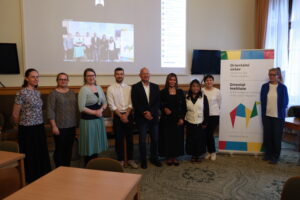
Report: AI Knowledge Café
By Loida Garcia-Febo, Chair of IFLA Management of Library Associations Section (MLAS)
Moderator of the Event
“Librarians, Researchers, and AI: Shaping Information, Science, and Society?”
Prague, Czech Republic
Hosted by the Oriental Institute of the Czech Academy of Sciences
Event Curator and Coordinator: Dr. Reysa Alenzuela, Research Fellow and Head Librarian, Oriental Institute of the Czech Academy of Sciences
Introduction
On September 5, 2025, I had the honor of moderating the AI Knowledge Café as Chair of IFLA MLAS, on the theme “Librarians, Researchers, and AI: Shaping Information, Science, and Society?” hosted by the Oriental Institute of the Czech Academy of Sciences in Prague. This event, which attracted more than 650 registrants from across the globe, highlighted the growing interest in the intersection of AI, libraries, and research. It was also framed within the national consultations and coordination efforts toward a Czech national strategy for AI.
The event provided a unique space to explore how libraries and research communities can shape AI’s role in society, fostering a critical dialogue about its potential and responsibilities.
This is a report written from the perspective of the moderator. A complete report and further information are available on the event website: https://sites.google.com/view/ai-strategie-ai-knowledge-cafe/session-recording-librarians-researchers-and-ai
Opening Context
As moderator, it was of utmost importance to emphasize the urgency of engaging critically with AI at this transformative moment in human history:
- AI is no longer futuristic—it is actively shaping how we search, teach, learn, preserve memory, and make decisions.
- The profound potential of AI must be balanced with equally profound responsibilities to safeguard ethics, truth, and inclusion.
- Librarians and researchers hold a unique role in shaping how AI is integrated into society, advocating for equity and human rights while preventing bias and misinformation.
Discussants and Contributions
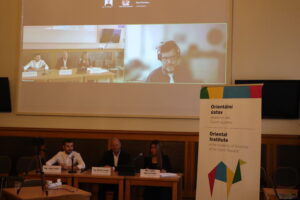
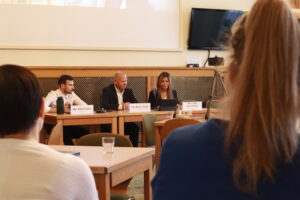
The panel featured five international experts who brought diverse perspectives to the discussion:
- Thanos Giannakopoulos, Director of the United Nations Library
- Dr. Mayasari “Maya” binti Abdul Majid, Library Director, Malaysia
- Ing. Martin Lhoták, Library of the Academy of Sciences of the Czech Republic
- Mgr. Adam Urban, National Library of Technology, Czech Republic
- PhDr. Ladislava Zbiejczuk Suchá, Masaryk University
Their contributions provided a rich diversity of viewpoints, each shedding light on different facets of AI’s impact on libraries, research, and society at large.
The recording of the event and presentations from the discussants will be available on the following page: https://sites.google.com/view/ai-strategie-ai-knowledge-cafe/session-recording-librarians-researchers-and-ai
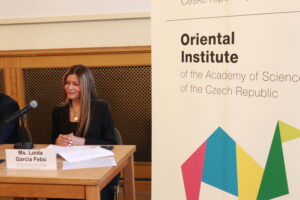
Moderator’s Highlights and Analysis
As the moderator, my goal was to connect the panelists’ insights with broader themes and contextualize the discussion within global challenges and opportunities. Below are some of the key points I gathered during the event:
- From Dr. Giannakopoulos:
- Investing in the upskilling of librarians is crucial.
- Defining what AI is and how it works must be a priority.
- Libraries are bastions of trust, yet must remain vigilant of how unchecked technologies can amplify bias.
- AI has a key role in advancing the United Nations Sustainable Development Goals (SDGs).
- A future where information is equitable depends on the responsible integration of AI.
- From Ing. Lhoták:
- The Czech Digital Library demonstrates a remarkable national effort that can serve as inspiration globally.
- Multi-lateral, multi-sectoral, and multi-disciplinary collaborations are essential to advance AI in libraries.
- From Mgr. Urban:
- Hybrid and AI-driven workflows are influencing library strategies.
- Ethical considerations are vital, especially given real-world cases of misconduct in professions such as law and real estate where misuse of AI led to penalties.
- AI intersects with the preservation of democracy—a theme increasingly recognized at library conferences, including those in Germany, the Nordic region, and in the U.S. (ALA and San Jose State University iSchool’s Think Tank forum).
- From Dr. Abdul Majid:
- Helping library users understand how AI works is vital to support communities and societies.
- Libraries, as providers of equitable access to information, must be central in this process.
- Without libraries’ involvement, the risk is that corporations will dominate this educational role.
- From Dr. Zbiejczuk Suchá:
- A solutions-oriented approach is valuable as LIS programs increasingly create AI and Tech Labs (e.g., San Jose State University iSchool’s Virtual Reality Lab).
- The LIS community might adopt a “rabbit and turtle” approach—fast like the rabbit in adapting to AI, but cautious and deliberate like the turtle.
Group Discussions and Insights
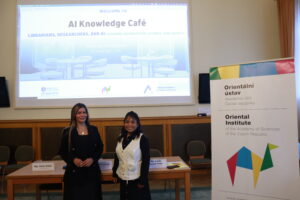
Dr. Alenzuela provided an analysis from the group discussions and insights from attendees who used Mentimeter to provide input. These will also be available here: https://sites.google.com/view/ai-strategie-ai-knowledge-cafe/session-recording-librarians-researchers-and-ai
The discussion with online participants paints AI as a transformative but contested force in libraries. Participants are still taking caution on its impact. The following key themes emerged from the three questions raised to the participants:
- How is AI influencing libraries?
Positive impacts:
- Efficiency (“works became easier,” “efficient, dynamic, innovative,” “expanding, streamlining, transforming”)
- Accessibility (“democratization access ease,” “assistance accessibility,” “accessibility of information”)
- Research enhancement (“enhancing research outputs”)
- Concerns: “noise confusion bias,” “uncertainty, risky, innovative,” “increasing environmental impact”
- Takeaway: AI is seen as empowering yet disruptive, reshaping library functions.
- How is AI reshaping the research process?
- Positive view: “accelerated,” “efficiency,” “ease,” “productivity”
- Concerns: “dependence,” “plagiarism,” “misinformation,” “hallucinations,” “multilingualism at risk”
- Takeaway: AI is viewed as a powerful accelerator but raises questions on originality, accuracy, and inclusivity.
- Role of librarians and researchers
- Accountability & verification: “verify the data and sources,” “accuracy verification by checking for biases,” “fact checker”
- Education & literacy: “AI literacy programs,” “teach students to be responsible,” “critical thinking,” “continued media literacy”
- Ethical responsibility: “suggest ethical considerations,” “promote library values,” “promoting ethical use”
Takeaway: Balance human judgment with AI use, reduce dependence, and ensure integrity, critical thinking, and oversight remain central.
Emerging Themes
Several cross-cutting themes emerged throughout the discussions, providing a clear roadmap for libraries and researchers navigating the future of AI:
- Promise of AI: Enhancing access to information, accelerating scientific discovery, and fostering innovation.
- Ethics and Trust: The critical need for oversight and frameworks that promote responsible AI use.
- Equity and Inclusion: Libraries must ensure AI contributes to reducing inequality rather than exacerbating it.
- Libraries as Leaders: Libraries have a unique opportunity to guide AI’s use in ways that benefit society.
- Collaboration: International and multi-disciplinary cooperation is necessary to ensure AI is used for the public good.
Closing Reflections
In my concluding remarks I summarized the discussion, reminding participants that AI is not only a technological tool but also a societal force. Stressing that the future of AI in libraries and research will depend on sustained collaboration, education, and commitment to ethics, trust, and equity. Librarians, researchers, and educators have a critical role to play in ensuring that AI is used for the greater good, contributing positively to knowledge, science, and society.
Thanks to Dr. Alenzuela and the panelists—Dr. Giannakopoulos, Dr. Abdul Majid, Ing. Lhoták, Mgr. Urban, and Dr. Zbiejczuk Suchá—for their visionary insights, and the audience for contributing to an engaged and critical conversation.
The AI Knowledge Café reaffirmed that librarians, researchers, and educators are central to ensuring AI contributes positively to knowledge, science, and society.